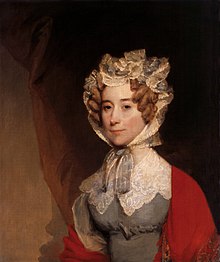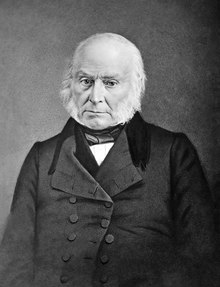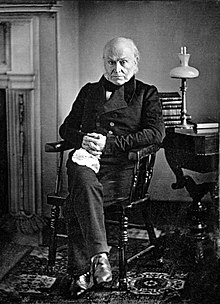John Quincy Adams
John Quincy Adams [ d͡ʒɒn ˈkwɪnsi ˈædəmz ] (born July 11, 1767 in Braintree (today: Quincy ), Norfolk County , Province of Massachusetts Bay , † February 23, 1848 in Washington, DC ) was an American politician and diplomat as well as the sixth President of the United States from March 4, 1825 to March 4, 1829. He was a member of the well-known Adams family . His father, John Adams, was the country's second president.
Life to the presidency

Like his father, John Quincy Adams was an avid Unitarian . He accompanied him on his diplomatic missions in 1778 and 1780 to the Kingdom of France and the Republic of the Seven United Provinces . Adams acquired an excellent knowledge of French , which is why he accompanied the ambassador Francis Dana , who barely spoke this language, as private secretary to St. Petersburg at the court of Catherine the Great in July 1781 . Before his second departure to Europe, his father had asked him to keep a diary, the first entry of which is dated November 12, 1779. At first he ran it very irregularly, but over the years it became a daily routine. It is an invaluable historical source and is included as a reference in almost every work on American history for the pre- Civil War era .
He completed his law studies, which began at the University of Leiden , in 1787 at Harvard University in Cambridge . He initially practiced as a lawyer in Boston . In 1794 Adams was appointed envoy to the Netherlands, in 1796 he was envoy to Portugal and 1797 to Prussia . On July 26, 1797, he married Louisa Catherine Johnson , the 22-year-old daughter of the American consul in London. His parents had initially spoken out against this association because they viewed a non-American-born wife as a threat to his political ambitions. In 1797 he was elected to the American Academy of Arts and Sciences . While he was working in Berlin in 1800/01, he and his wife went on an extensive journey through the Prussian province of Silesia , which inspired him very literarily and found expression in several letters to his brother Thomas. This took care of their publication some time later. The Letters on Silesia: Written during a tour through that country in the years 1800, 1801 were translated into German and French. In 1802, Adams was elected to the Massachusetts Senate and ran unsuccessfully for the US House of Representatives . Since 1818 he was an elected member of the American Philosophical Society .
Adams was elected a federalist to the Senate in 1803 and resigned from office in 1808, six months after breaking with the federalists. From 1809 to 1814 Adams was envoy to Russia and in 1814 was a member of the commission negotiating the Ghent Peace Treaty between the United States and Great Britain . From 1815 to 1817 he was the American envoy to Great Britain. From 1817 to 1825, Adams was Secretary of State in the cabinet of President James Monroe . In this function he negotiated, among other things, the Adams-Onís Treaty of 1819 with Spain , which redefined the borders of the United States with the viceroyalty of New Spain . For the United States, this treaty meant that its territorial claims extended westward across the Mississippi so that claims to the Oregon Country could reach the Pacific Ocean. Adams saw this treaty as his greatest success, foreseeing that it would be possible from Oregon to trade with the Orient and the economic powers in the Pacific.
Presidential candidacy 1824
As Secretary of State, Adams ran for the presidential election of 1824 after President Monroe failed to seek a third term. The election was characterized by a peculiarity, namely four candidates from the Democratic Republican Party ran . In addition to Adams, Andrew Jackson , William H. Crawford and Henry Clay ran for the presidency. After the votes were counted in December 1824, it was clear that Jackson had gained a majority with around 41 percent of the vote. Almost 31 percent of the voters were in favor of Adams, Crawford and Clay were far behind with 11 and 13 percent respectively. Although Jackson had won the Popular Vote by a solid margin, he could not win the absolute majority required on the electoral body . This gave the House of Representatives the election of the President. In the February 1825 election, when the MPs had the choice of three top-ranked, Adams received 87 votes in the first ballot, Jackson 71 and Crawford 54. Adams was elected President. After naming Clay, fourth-placed, Secretary of State, Jackson accused both of them of corruption .
President of the USA (1825–1829)
Adams assumed the presidency on March 4, 1825. When he was inaugurated, he was the only president who took the oath not on a Bible or religious book, but on the American Constitution . Adams cited the separation of church and state as the reason . During his four years in the White House , Vice President was John C. Calhoun , who in the 1824 election received the necessary number of votes on the electoral body straight away.
In terms of foreign policy, his presidency was characterized by a difficult relationship with the United Kingdom . The Anglo-American Convention of 1815 agreed after the end of the British-American War between America and the United Kingdom , which was confirmed and extended in the London Treaty in 1818 , had made direct trade between the two states possible again. In addition, the kingdom had opened ports in British India and Southeast Asia to American ships. Under Adams, Foreign Minister Henry Clay negotiated free access to the West Indies , which was opposed , among other things, by the London government's call for Imperial Preference , i.e. the betterment of trade within the British Empire . In 1827 the United Kingdom opened its ports in the Caribbean to all nations except the United States and ended negotiations with Washington. Adams was therefore forced in the spring of 1827 to close American ports to British ships. It was only after his tenure that trade with India could be normalized again.
Although he tended to advocate restraint on the issue of protective tariffs domestically , a new regulation was inevitable during his term of office due to an expiring law. Despite the reservations of the president, he signed a regulation to reorganize protective tariffs in 1828. In particular, the sharply increased import fees on English woolen goods led to bitter controversy. In the southern states in particular , the new law, and with it Adam, was sharply criticized.
Andrew Jackson, who saw himself as the actual winner as early as 1824, began his campaign for the 1828 election as early as 1825/26 . With a clear majority of 56 percent versus 42 percent, Jackson won the election very clearly. Also in the elections this time Jackson was able to clearly win with 178 to 83. This made Adams the second president in American history to be reelected after his father, John Adams, in 1800 .
During Adams's tenure, many states abandoned the minimum wealth requirement to vote: the presidential elections in 1828 had three times as many voters as they did in 1824; a circumstance that helped the re-running Jackson to his electoral success in 1828. Women and released slaves continued to be excluded from the elections. Adams was the first president to interview a woman: the writer Anne Royall stole his clothes while bathing in a river and threatened not to return them without an interview.
Further political career and retirement

Unlike many American presidents, Adams reappeared politically after the end of his presidency in March 1829. In the congressional elections in 1830, he won the election to the House of Representatives as a representative of the National Republicans . He was a member of this after several re-elections until his death. Among other things, he was chairman of an economic committee, the committee on Indian issues and the foreign affairs committee. Adams was the only ex-president elected to the House of Representatives and one of only two former heads of state to rejoin Congress . Alongside him, Andrew Johnson succeeded in being re-elected Senator in 1875 .
In 1834 he failed in an attempt to be elected governor of Massachusetts. In 1841 he represented the slaves of the Spanish slave ship La Amistad , who had succeeded in revolting against their oppressors and landed in the United States, before the Supreme Court in the Amistad trials . He achieved that they were not extradited to Spain , but could return to their homeland as free people. Adams also rejected an annexation of Texas , as well as opposed the Mexican-American War , which he viewed as the war to expand slavery.
Adams died on February 23, 1848 at the age of 80 from the effects of his second stroke , having suffered one two years earlier.
Both his son, Charles Francis Adams, Sr., and grandson, Charles Francis Adams, Jr., were candidates for the post of Vice President of the United States.
The site of his birth and home in Quincy, near Boston, where five generations of the politically influential Adams family lived, is designated as the Adams National Historical Park .
Eponyms
The asteroid (4372) Quincy , discovered on October 3, 1984, was named after him in 1990. The Adams Glacier in Antarctica also bears his name. In addition, three counties in the United States are named after Adams.
Others
- Adams, who had learned the German language in his youth, translated the verse epic Oberon by Christoph Martin Wieland into English in later years . Wieland is said to have been very satisfied with the transfer.
- In the 1997 film Amistad , Adams was portrayed by Anthony Hopkins .
See also
Movies
- Life Portrait of James Buchanan on C-SPAN , April 18, 1999, 119 minutes (English-language documentation and discussion with historian Lynn Hudson Parson and William M. Fowler Jr.)
Works
- Letters on Silesia: Written during a tour through that country in the years 1800, 1801. 1804, LCCN 04-027115 .
literature
- Hermann Wellenreuther : John Quincy Adams (1825–1829): Foreign politician and president over the parties. In: Christof Mauch (ed.): The American Presidents: 44 historical portraits from George Washington to Barack Obama. 6th, continued and updated edition. Beck, Munich 2013, ISBN 978-3-406-58742-9 , pp. 106-116.
- Harlow Giles Unger: John Quincy Adams. Da Capo Press, Boston 2012, ISBN 978-0-3068-2129-5 .
- Joseph Wheelan: Mr. Adams's Last Crusade: John Quincy Adams's Extraordinary Post-Presidential Life in Congress. Public Affairs, New York 2008, ISBN 978-0-7867-2012-5 .
- Gerald A. Danzer: The Americans. McDougal Littell, Boston, Mass. 2003, ISBN 0-618-10816-5 .
- Robert V. Remini: John Quincy Adams. (= The American Presidents Series. Ed. By Arthur M. Schlesinger , Sean Wilentz . The 6th President.) Time Books, New York 2002, ISBN 0-8050-6939-9 .
- James E. Lewis: John Quincy Adams. Policy maker for the union. SR Books, Wilmington, Del. 2001, ISBN 0-8420-2623-1 .
- Paul C. Nagel: John Quincy Adams. A public life, a private life. Knopf, New York 1997, ISBN 0-679-40444-9 .
- Patrick J. Owens: John Quincy Adams and American utilitarism. University Press, Notre Dame, Indiana 1976 (PhD thesis).
- Marie B. Hecht: John Quincy Adams: A personal history of an independent man. Macmillan, New York 1972, LCCN 72-077279
- Walter John Morris: John Quincy Adams, Germanophile. Pennsylvania State University, 1963.
- George A. Lipsky: John Quincy Adams. His theory and ideas. Crowell, New York 1950.
Web links
- John Quincy Adams in the Internet Movie Database (English)
- Biography on the side of the White House ( Memento of 17 January 2009 at the Internet Archive ) (English)
- John Quincy Adams in the Biographical Directory of the United States Congress (English)
- John Quincy Adams in the nndb (English)
- American President: John Quincy Adams (1767-1848). Miller Center of Public Affairs of the University of Virginia (English, Editor: Margaret A. Hogan)
- The American Presidency Project: John Quincy Adams. University of California, Santa Barbara database ofspeeches and other documents from all American presidents
- 22633912 John Quincy Adams in the database of Find a Grave (English)
Individual evidence
- ^ Robert V. Remini: John Quincy Adams. 2002, pp. 6-11.
- ↑ Book of Members 1780 – present, Chapter A. (PDF; 945 kB) In: American Academy of Arts and Sciences (amacad.org). Retrieved April 4, 2018 .
- ^ Robert V. Remini: John Quincy Adams. 2002, p. 31f.
-
^ Member History: John Q. Adams. American Philosophical Society, accessed April 4, 2018 . Margaret A. Hogan: John Quincy Adams: Life Before the Presidency. In Miller Center of Public Affairs of the University of Virginia , accessed on May 28, 2020th
- ^ Margaret A. Hogan: John Q. Adams: Campaigns and elections. In Miller Center of Public Affairs of the University of Virginia , accessed on May 28, 2020th
- ^ Inauguration of President John Quincy Adams. (English)
- ↑ Edward S. Mihalkanin (ed.): American Statesmen: Secretaries of State from John Jay to Colin Powell. Greenwood Publishing Group, Westport (CT) 2004, ISBN 978-0-3133-0828-4 , pp. 127, 128
- ↑ Christof Mauch: The American Presidents. CH Beck, Munich, ISBN 978-3-406-58742-9 , p. 114.
- ↑ Christof Mauch: The American Presidents. CH Beck Munich, ISBN 978-3-406-58742-9 , pp. 114-115
- ↑ Minor Planet Circ. 17224.
- ↑ Charles Curry Aiken, Joseph Nathan Kane: The American Counties: Origins of County Names, Dates of Creation, Area, and Population Data, 1950-2010 . 6th edition. Scarecrow Press, Lanham 2013, ISBN 978-0-8108-8762-6 , p. XIV .
| personal data | |
|---|---|
| SURNAME | Adams, John Quincy |
| BRIEF DESCRIPTION | American politician, sixth President of the United States |
| DATE OF BIRTH | July 11, 1767 |
| PLACE OF BIRTH | Braintree , Massachusetts |
| DATE OF DEATH | February 23, 1848 |
| Place of death | Washington, DC |






